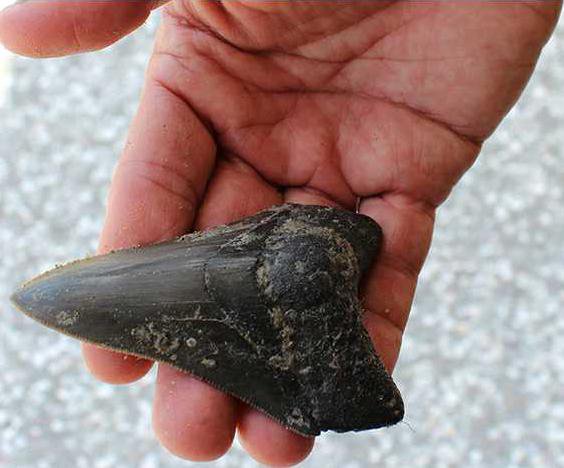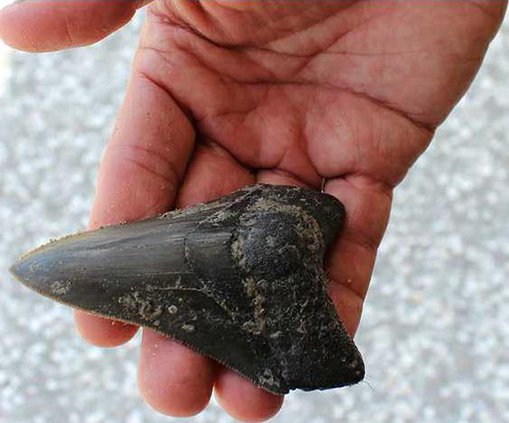Bill Eberlein, of Megateeth, is best known for the prehistoric shark teeth he discovers in Georgia’s coastal waters. A former college instructor turned full-time fossil finder, Eberlein lives out his dream job searching the waters and embracing all the ocean has to offer.
As a young child growing up in Erie, Pennsylvania, Eberlein was no stranger to the water. His love for the ocean developed at a very young age and came from his mother and father. The family frequented Lake Erie and share memories and love of the water.
After graduating from Pennsylvania State University with a bachelor’s in accounting and economics, Eberlein went on to pursue a master’s in accounting and information technology from Davenport University. Despite his love of the water, his academia was leading in a much different direction.
Eberlein was a member of the Erie County Sheriff’s Office’s Scuba Search and Recovery Team from 1987 to 1999. He worked 12 years for Savannah Technical College as an instructor — six of those years he worked part time. As he pushed further into his career, he began to feel drawn away from the classroom. What was once a hobby became a full-time job.
Eberlein has been a premier seller of shark teeth since 1999. His work has been featured in well-known publications over the years.
He shares his passion of the ocean with his wife, Dodie, whom he met while serving as the president of the Rotary Club of Richmond Hill in 2012. At that time, Dodie also was serving as president for a nearby Rotary club. She lived on Tybee Island for many years. So it was no surprise the pair hit it off and shared a true love of diving, boating and beaches. Bill and Dodie married in 2014.
Bill Eberlein dives four or five days a week. After years of successful diving, he wasn’t anticipating the events that took place in January just off St. Catherine’s Island.
As usual, Eberlein and his boat captain went out for a normal work day in the ocean. As he went down, an unusually strong current immediately began pull him back. Eberlein had “tied off,” as he does with each dive, but this time, because of the strong current, his normal tie-off was not going as planned. The safety line attaching him to his anchor was pulled from his grasp, and the current began to push him out.
As a seasoned diver, Eberlein admits he felt he could “compensate for it while searching for a low-current pocket.” As the ocean’s current pulled Eberlein, he realized he was being dragged underwater. His normal routine usually consisted of being down an hour before surfacing. On this day, Eberlein rose to the surface after approximately 40 minutes. Upon coming to the surface, he realized he was much farther behind the boat than he anticipated.
The strong current was continuing to push him out. He considered his situation.
“The sun was low, and the boat driver would have had to look directly into the sun to see him; visibility would have been difficult,” he said.
As he dropped his weight belt, Eberlein said, he felt at peace as the dolphins swam around him. With such a deep love and respect for the ocean, Eberlein had no need to panic.
But as the first hour slowly passed, Eberlein began to worry.
“I never worried about myself or my own safety,” he said. “I just worried my wife, Dodie, would hear something about me missing. I didn’t want her to worry. I also began to process whether or not something had happened to the boat driver.”
He realized that in the event something had happened to him, no one would know he was out there.
Facing adversity in the ocean is not uncommon for a diver.
“Diving in Coastal Georgia waters is not like what people see on TV; it is not like the Bahamas or the Caribbean,” Eberlein said.
Divers in Georgia waters deal with zero visibility at times and extremely strong currents. Despite these challenges, he said, the greatest joys of diving come from the “silence and joy of finding things.”
On this particular day, this dive and situation was anything but normal for this seasoned diver. Eberlein dropped his weight belt and began watching the tide times. As he saved his strength, he slowly kicked toward the shore and waited it out. He knew at some point he would have to find safety one way or another. Eberlein began to think he might have to do this himself.
Eberlein said he “blew up a 5-foot inflatable marker in hopes someone would see it.”
Well into his second hour in the ocean, he realized he eventually would have to swim to shore.
But his adventure took a sudden, welcome turn when he caught site of the Sea Tow boat. Then he caught site of the Coast Guard unit and began to breathe a sigh of relief.
“Sea Tow truly provides great service,” Eberlein, a Sea Tow member, said. “They are the ones who coordinated the initial stages, made the calls and sent the boats out.”
He cannot say enough about his gratitude for all they did that day. As he drifted in the ocean that day, he began to consider how serious this situation had been. But he had no need to worry anymore. Between Sea Tow and the Coast Guard, he knew he was safe, and this was all over.
After being pulled onto the boat, Eberlein said the Coast Guard was “extremely excited” to see him.
The reality set in that these men and women of the Coast Guard more often perform a recovery mission instead of a rescue. The Coast Guard crew members truly were happy to see him, he said.
Eberlein said that after he initially descended into the water, his boat driver immediately sensed something was wrong. Eberlein said he “is grateful the call was made in to Sea Tow. The situation could have been much worse.”
In all his years of diving since 1986, nothing like this had happened to him.
One would think this might prompt a diver to take an incident like this as a sign to return to the normal 9-to-5 lifestyle. But not Eberlein.
“Recently, the weather was cold, and it was just going to be one of those dives,” he said. “As I walked out to the boat, I can remember thinking I would rather be out here any day than living behind a desk.”
It was then he realized that no matter the risk, the reward of being a diver and finding fossils truly was a dream job. Despite the January incident, Bill Eberlein hasn’t slowed down one bit.
Eberlein said that now, he is more careful, and if he cannot clip on to the anchor, he stops cuts short his dive and immediately returns to the suface. He takes full advantage of his new marine radio, a gift from a friend.
The ocean can be beautiful and dangerous.
“When accidents happen, it is usually caused by many little things, not one major issue” Eberlein said. “We try our best to avoid that.”
His ability to stay calm, conserve energy and wait on the tide to change truly were life savers that day. He said he was overwhelmed by the prayers and support of his friends and the community.
Eberlein said he loves the ocean and will continue living out his dream job as a fossil finder.
Experienced diver describes rescue
Danger of diving doesn't stop area man


Sign up for our e-newsletters